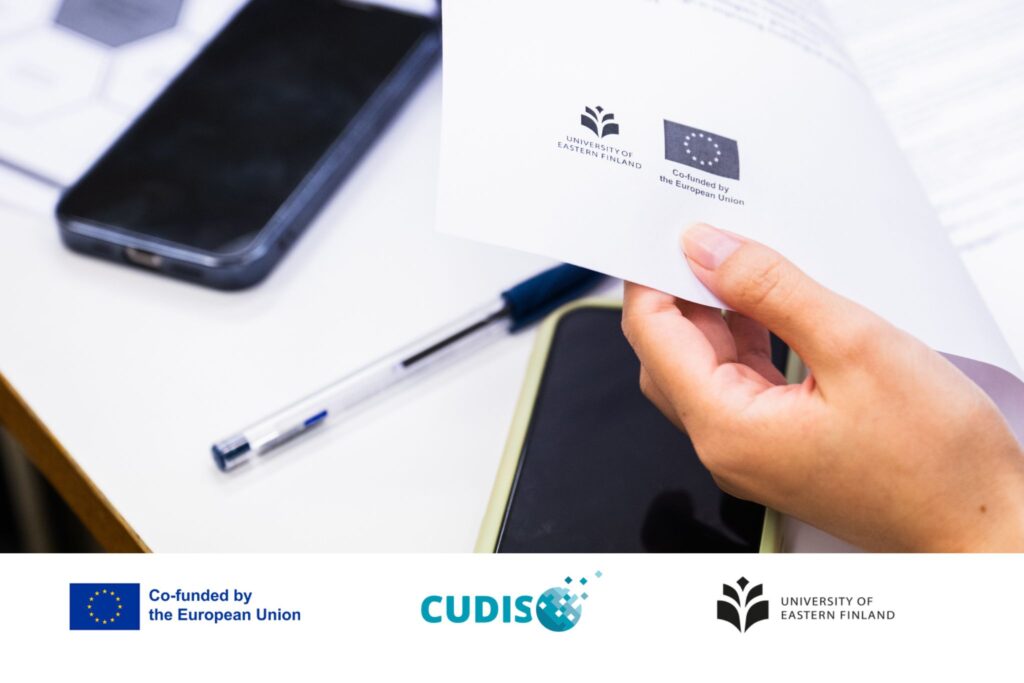Staying in North Karelia permanently? International students’ suggestions for strengthening the region’s retention power

Under what conditions would you stay in North Karelia after graduation? Do you have development ideas for supporting international students in settling in the region. These were some of the questions asked from international students from the UEF who participated in the CUDIS workshop Would you stay in North Karelia? in April 2025. The results of the workshop were presented in the Kansainvälistyvän Pohjois-Karjalan vastuulliset ratkaisut (transl. Responsible solutions for internationalising North Karelia) spring seminar which was organised by the CUDIS project and the Regional Council of North Karelia. The results will be utilised in the council’s strategic work.
The themes that laid the groundwork for the workshop discussions were work-life connections and skills as part of education, regional employment opportunities, and support networks. Although the initial assumption was that jobs are the main attraction and retention factor in the area, the discussions highlighted many structural issues. Addressing these issues can improve the settlement and employment opportunities for international students in the region.
Lowering the language barrier
All the workshop participants have been made aware of the intense competition for jobs in North Karelia. Finding information about regional job opportunities is difficult. Platforms such as JobTeaser are unfamiliar or perceived as difficult to use, especially when the job search is limited to a smaller area. There are not many higher education positions open especially for those who are learning Finnish. Pitkänen et al. (2023, 25) show similar findings in their research on international students’ views on Finland: According to the respondents the biggest obstacles for settling and adapting are the language barrier (50%) and the challenges in finding work (44%).
By publishing job advertisements only in Finnish, employers exclude potential foreign-language speaking applicants. Language proficiency requirements are also high – good Finnish language skills are required in almost all jobs, whether in management or operational work such as cleaning. The high language proficiency requirements raised a question among the workshop participants of whether the language requirement is a pretext for excluding foreign jobseekers. Are Finnish workplaces so comfort-oriented that they don’t’ want any extra (language) stress in their work communities? If not, employers should pay more attention to recruitment practices and to the employer brand image, starting from the organisation’s website and communication. Could North Karelia follow the example of Germany where immigrant recruited into companies can learn the language during their working hours? A job provides continuity, stability and motivation to learn the language.
The workshop participants agreed that learning Finnish is an important part of integrating into Finland. They were grateful for the opportunity to study Finnish during their studies but pointed out that the free language courses provided by UEF and other organisations could be more practical and focused on everyday interaction. The discussions also pointed out that learning a language from a small linguistic area is a huge investment in a situation where employment immediately after graduation is uncertain and the residence permit for job search is relatively short.
Support for building connections
Another key topic in the discussions was networking. Finding hidden jobs requires extensive (professional networks). According to UEF’s career tracking (Suorsa 2022, 59) networks are the most important way to find employment in Finland for international students. The connections to working life vary between the degree programmes of the University of Eastern Finland. However, it is possible to include practical working life examples in the courses without compromising the quality of academic education. A clear message from the workshop participants is that direct connections and opportunities to meet local employers should be offered to everyone from the beginning of their studies. The participants also supported the idea of developing UEF’s current alumni activities in a way that supports international students in forming working life connections.
Regional company visits and a development service aimed at companies, organised by the CUDIS project, were deemed effective methods for building connections. Additionally, the support provided by UEF Career Services for international students is appreciated, but the participants suggested more in-person implementations instead of online courses. Learning about Finnish working life practices and the bureaucracy of starting a business are topics that should be discussed at the beginning of studies. This would make it easier, for example, to start working part-time.
In addition to professional networks, the students brought up other important connections that play a significant role in integration. We learned that during their studies international students find it easy to connect with each other, while Finnish students remain more distant. This division is reinforced by various factors, such as student associations mostly communicating in Finnish and the groups not mixing during courses.
According to those who participated in the workshop, Finns are friendly and helpful but making deep and lasting connections is difficult. However, it is Finnish friends (25%) who play an important part in supporting international students’ adaptation to Finland (Pitkänen et al. 2023, 23). Other important support network is the staff of the educational institution (28%). For example, UEF’s YUFE Friend Programme promotes interaction between local and international students but the participants were unfamiliar with the activities. Also, volunteering opportunities by local associations were unfamiliar to most workshop participants. There are some opportunities available but the information hasn’t reached international students.
First two steps towards a more international region
Highly educated experts are in demand all over the world. None of the students graduating from international master’s degree programmes have to stay in Finland, let alone in North Karelia. As one participant pointed out, finding a job from Central Europe is faster and more likely even with just basic language skills of the target country. Still, many wish to stay in the region after their studies.
The students told us that they appreciate the tranquillity, safety, cleanliness, nature and friendly people in North Karelia. They appreciate the people-oriented scale of smaller towns. The education opportunities and services are deemed as high quality in the region, and in Finland in general. Students with family, especially, value the high-quality day care, basic education and spacious student apartments. The cleanliness and spaciousness of the living environment are important factors for the quality of life when considering the attractiveness of the area.
The job market in the region creates challenges for international talent. Currently, there are not many higher education positions open. Nevertheless, both regional developers and companies should support the settlement and employment of international students. The region is still a developing area in terms of internationalisation. In 2022, about 7800 foreign-language speakers lived in North Karelia. Their share (5 %) of the region’s population is about half the country’s average.[1] In order to retain educated, motivated and work-ready residents in North Karelia, a change in both practices and attitudes is needed.
The message from international students who participated in the workshop to regional decision-makers and employers can be summarised in two proposals to start with – improving the flow of information regarding job search and employment and being flexible with language proficiency requirements.
In an ideal situation, information about services, training, and events aimed at international students would be available through a one-stop-shop principle. Higher education institutions should ensure that information is available to students from the very beginning of their studies.
The second step concerns the adjustment of Finnish language skills in recruitment. Learning Finnish is a worthwhile investment for international students only after securing employment. Many international students learn the basics of Finnish during their studies, but achieving a higher proficiency takes time and practice. Fortunately, workplaces can quite easily support the language learning of motivated employees. Work communities can get started by using materials from Kielibuusti (Kielibuusti 2025). Also, many projects offer free training and materials for employers. In additions to the CUDIS project, we encourage organisations operating in Eastern Finland to familiarize themselves with the VETOA project, Talent Hub Eastern Finland project and WiNK project (VETOA 2025; THEF 2025; WiNK 2025).

Written by Project Coordinator Anna Logrén (CUDIS project).
Translated by Project Secretary Oona Järvinen.
Title edited 19 May 2025.
References
Kielibuusti 2025. Kielibuusti. Portti suomen ja ruotsin oppimiseen. https://www.kielibuusti.fi/fi.
Pitkänen, Ville ym. 2023. International students in Finland: studies, everyday life, employment and plans for the future. International Talent Finland Research Project, E2 Research.
Pohjois-Karjalan maakuntaliitto 2023. Pohjois-Karjalan kansainvälisen toiminnan tiekartta. https://pohjois-karjala.fi/wp-content/uploads/2023/09/Kansainvalisen-toiminnan-tiekartta.pdf.
Suorsa, Outi 2022. Kansainväliset opiskelijat työmarkkinoilla. Itä-Suomen yliopistosta valmistuneiden kansainvälisten opiskelijoiden työllistymistilanteet vuosina 2016–2020. Publications of University of Eastern Finland General Series 28. University of Eastern Finland, Joensuu.
THEF 2025. Talent Hub Eastern Finland. https://uefconnect.uef.fi/talent-hub-eastern-finland/.
Tilastokeskus 2025. Vieraskielisten määrä kasvoi yli 50 000:lla vuonna 2024 – Uudenmaan väestöstä lähes viidennes ulkomaista syntyperää. https://stat.fi/fi/uutinen/Vieraskielisten-maeaerae-kasvoi-yli-50-000lla-vuonna-2024-Uudenmaan-vaeestoestae-laehes-viidennes-ulkomaista-syntyperaeae.
VETOA 2025. Veto- ja pitovoimaa Pohjois-Savon hyvinvointialueelle (VETOA). https://uefconnect.uef.fi/veto-ja-pitovoimaa-monikulttuurisesta-tyoyhteisosta-pohjois-savon-hyvinvointialueelle-vetoa/.
WiNK 2025. WiNK – töihin Pohjois-Karjalaan. https://uefconnect.uef.fi/wink/.
[1] Pohjois-Karjalan maakuntaliitto 2023, 4; Tilastokeskus 2025.